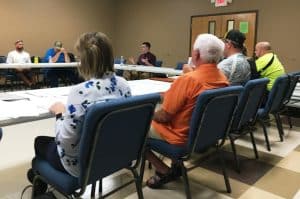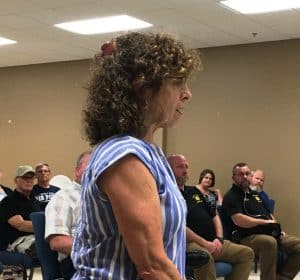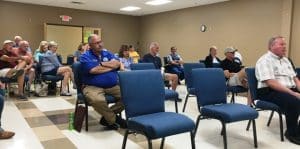August 27, 2023
By: Dwayne Page
Should DeKalb County establish regulations to keep landowners from creating health and safety concerns for their neighbors?
During Monday night’s regular monthly meeting, the county commission is expected to consider passage of a “County Powers Act” resolution as well as one to establish and enforce regulatory standards regarding health and safety conditions of residential and non-residential properties within the confines of DeKalb County outside the boundaries of the municipalities which already have codes and ordinances.
The meeting will be at 6:30 p.m. in the auditorium of the Mike Foster Multi-Purpose Center (County Complex).
The idea is to prevent or eliminate dangerous and or unsanitary conditions resulting from overgrown vegetation, accumulation of debris, trash, litter, and garbage, or the presence of vacant dilapidated buildings or structures. Although DeKalb County currently has no zoning regulations in place, the “County Powers Act” gives counties, without establishing zoning, the authority to set and enforce standards for county property owners with respect to nuisances and other practices deemed detrimental to their neighbors.
The recommendation for passage of the “County Powers Act” resolution is being made by the Government Services Committee of the County Commission which met last Tuesday night and voted to send it on to the full commission for consideration. A two thirds vote of the 14-member commission is required to pass either or both resolutions.
In order to establish the regulations for compliance, the commission must first adopt the County Powers Act resolution which authorizes the standards. If approved, a five-member hearing board with staggered terms (consisting of county commissioners) would be established as well as an enforcement officer position, all appointed by the county mayor with the concurrence of the full commission. DeKalb County’s Safety Officer, which is a paid position and already established, would most likely be assigned to take on this new Enforcement Officer responsibility along with his regular duties. When a resident files a complaint, the enforcement officer would investigate and if he finds a violation, he must notify the landowner in person or by certified mail. The property owner then has 30 days to remedy the issue or request a hearing before the hearing board which must meet and act within 30 days. If the board upholds the enforcement officer’s findings, the violator is fined $50 per day per occurrence. Violators can also be taken to General Sessions Court if they don’t comply.
The hearing board also has the authority to recruit or coordinate efforts of community organizations, neighbors, religious institutions, and or other agencies to provide assistance to persons who are not financially or physically able to comply on their own with the requirements of these regulations.
The issue is already stirring debate among proponents and opponents.
During Thursday night’s county commission’s committee meeting of the whole, several residents showed up to express their opinions during the public comment period and one member of the commission, Justin Adcock expressed his opposition to the county moving forward on this initiative.
“One reason why this got brought up is because we had some people come to us to say they had a neighbor who was devaluing their property and that rodents or trash were coming over onto their property causing a health and safety hazard,” said County Mayor Matt Adcock.
“It looks like volunteerism is going to be part of this Act,” said Kathy Bottomly, a resident of Clear View Drive who was the first to address the county commission. “I want to know if any of you have looked at this and can let us know where we can sign up because I know a lot of people would want to volunteer and help the elderly, handicapped, or someone who doesn’t have the means (to clean up their property). That is one of my concerns. That is an important addition to this. Another point is incentives for doing this. Is anyone aware of the incentives we have included in this Act from the State of Tennessee,” asked Bottomly.
Mike Bottomly, also a resident of Clear View Drive, said adopting the County Powers Act appears to be a good move, but he admonished the commissioners to study the issue thoroughly first.
“I suggest all commissioners really read it and understand what is in it. To me this is really a good thing. The county will get incentives back, money for the schools, and people will have to clean up their property a little bit. The county will look better than it does now. If there are landowners that cannot clean up their property for health reasons, they will have volunteers to do that for these people. I have a whole lot of volunteers sitting here, who would like to do that,” said Bottomly.
Bottomly’s reference to “money back for schools” was apparently from a passage in the County Powers Act law which gives counties that qualify the authority to enact under a separate resolution a tax levy on the privilege of residential developments known as a school facilities tax. The revenue is required by law to be used exclusively for funding growth-related capital expenditures for education. However in order to be able to assess such a tax the county must have experienced population growth over a period of time at a rate that qualifies it as a growth county and it is not clear if DeKalb County meets those conditions. In any event, the measure up for consideration Monday night does not include such a tax levy provision.
“What is the time frame once this person (violator) is given a notice? Eighteen of us are on Backbone Road so we have a concern,” asked Rick Carr, a resident of Back Bone Road.
Again, County Mayor Adcock explained that when a resident files a complaint, the enforcement officer investigates and if he finds a violation, he must notify the landowner in person or by certified mail. The property owner then has 30 days to remedy the issue or request a hearing before the hearing board which must meet and act within 30 days.
Jennifer Bright, a resident of Clear View Drive, said she has reservations about the regulations. “I feel like I am against it currently. I feel like its not put together well. You don’t have the regulations figured out. You’re opening it up to be anything. Anybody can go against their neighbor. If they don’t like their neighbor, they could see something they don’t like and say I am going to report them. Is there a way you could have the board draw it up more clearly so that this board could vote on it?. I feel like its pitting neighbors against neighbors in a sense. I understand sanitary things. I was raised in the country, but I have only been in this area for five years. I have also lived in Nashville. I feel pretty blessed and privileged with the life I have. I also realize other people don’t have that privilege and I realize that I wouldn’t want to be a judge as to what they should or should not do on their properties. There is a place close to our road that most of our neighbors do not appreciate the way the people live. I feel like I have some compassion for them because they are doing the best they can with what they have. They don’t know better, not to say somebody couldn’t help them to do better but is someone going to build them a better house, or store the things they have sitting around? Unlikely. It’s a lot of power to take on for this board. I don’t want my neighbor to be nasty but do you have the full community’s backing with this would be my question,” said Bright.
John Pace, a resident of Opal Pointe Drive asked the commission if definitions of the regulatory “health and safety” standards would be made clear to the public.
“Will there be definitions so that people will know what health and safety means on their property or could it be so broad that it could be chickens in the yard or too much grass growing or a couple of junk cars,” asked Pace.
Commissioner Larry Green explained that the regulations have already been established, modeled after Putnam County’s standards, should they be adopted by the DeKalb County Commission.
“There are detailed regulations, nine pages that define what needs to be enforced, needs to be cleaned up,” said Commissioner Green.
Commissioner Beth Pafford also pointed out that the proposed regulations specify who can make a complaint.
“The petition (complaint) has to be filed by at least one owner of property that’s within 500 yards of the boundary of whatever property they are saying is a violation. It can’t just be from somebody driving by. It needs to be somebody who owns property,” said Commissioner Pafford.
The proposed standards specifically state that “Whenever a petition is filed with the Enforcement Officer by at least one (1) owner or occupant of property that lies within five hundred (500) yards of the boundary of the property in question alleging that violation(s) of any of these regulations exist; or whenever the Enforcement Officer can visibly observe a violation from a public road, the Enforcement Officer shall, after making a preliminary investigation which discloses a basis for such violation, issue and cause to be served upon the owner of record of such properties a notice, stating the violations and request the condition to be remedied within 30 days of the service of the notice”.
Although he supports the concept, Commissioner Greg Matthews asked why the rush to take action now when he tried to get something done when he came into office after noticing a home with piles of garbage around it in the Shiney Rock area.
“My question is what’s changed from last year to now? I brought this up last year about a house on the Old Smithville Highway by a gas station but it was shot down. Now we are here anxious to push this through. I am for it, don’t get me wrong but what has changed,” asked Commissioner Matthews.
“I think more properties have since been brought to our attention by you (Commissioner Matthews) doing that, which had not been done before,” said Commissioner Myron Rhody.
Commissioner Green added that the issue became even more of a concern after a resident on Nikki Lane off Highway 70 east in the Midway Community came before the county commission during a workshop in June to complain about the stinky, unsightly and unsanitary condition of a neighbor’s unkempt property, a problem that had persisted for months up until that time.
“I think what has changed is when the lady came and talked to us at a commission meeting in June about the situation on Nikki Lane. Several of us went out there and looked at that situation and decided we need to figure out what we can do,” said Commissioner Green.
Commissioner Matthews also raised questions about the proposed regulatory standards for junk vehicles specifically a passage in the proposed regulations which states” the accumulation of two or more junk motor vehicles on the property”.
“Some of this stuff like vehicles in yards, two vehicles in a yard, I know people who buy a junk car to fix their car because its cheaper. We have to be very careful what we vote on,” he said.
Commissioner Matthews had questions about another passage of the standards which states “Should the Enforcement Officer be denied access to a property to inspect for violations, the enforcement officer can petition for an administrative search warrant”.
“Lets say this board starts issuing citations, search warrants, warrants, I would assume that would involve the Sheriff’s office. How does that affect Patrick (Ray),” asked Commissioner Matthews.
“The enforcement officer would be able to go onto the property. Normally if its causing an issue to neighbors you don’t even have to step foot on the property. You could be outside the property and examine it enough to get the details you need. I don’t think it would put any more work on the sheriff’s department,” replied County Mayor Adcock.
Commissioner Matthews further advised that the hearing board and enforcement officer get the proper training in what safety and health are as defined by the resolution in order to carry out their responsibilities properly.
County Mayor Adcock asked if the commissioners had received any public feedback on the proposed standards.
“The only calls I have had have been positive,” said Commissioner Rhody.
“I’ve had both,” added Commissioner Matthews. “Some agree while others say I pay my taxes and you don’t need to worry about my property. I see both sides,” he said.
Commissioner Justin Adcock said he is opposed to the proposed regulations.
“Its going to stir up a lot of stuff against people who have truly been farmers here for many years. People buy stuff in the county for a reason to live in the county and not be told what to do”.
Commissioner Adcock questioned why the issue is of concern now and suggested that outsiders moving to DeKalb County and Center Hill Lake may be behind the move.
“Did any of this get brought up before all these people started moving around Center Hill Lake and building these nice fancy homes? Has this ever been brought up” asked Commissioner Adcock.
“I have had a property owner for years complain about property across the road from them,” replied Commissioner Rhody. “He said I don’t even want it cleaned up just build a fence, like a privacy fence so he couldn’t see it”.
“Seems like we are getting a lot of these people from out of state moving to around Center Hill Lake that has problems with old farmers and some that let their yards grow up. That’s why we live out in the county. Its our property,” said Commissioner Adcock.
In response, Commissioner Susannah Cripps Daughtry said the purpose of the proposed standards is not to dictate to property owners but to ensure neighborhoods are kept safe and sanitary if there is a complaint.
“I don’t think anybody is trying to decide what everybody can do specifically with their property but its specifically health and safety standards. Its when it impacts other people. You have things that cause rats and bugs, and infestations that impact health and safety of other people and that infringes on their rights too. We have to consider that,” she said.
“With people who move in here, everything is health and safety,” Commissioner Adcock continued. “ I have had six cars. I have tractors, junk. Its my junk. So does everybody else. Its these people that keep moving in that have problems. You never did hear about this before, maybe once or twice. When they see this (regulations) they are going to start calling in on everybody” he said.
“I don’t think we want to enforce something to make it harder on somebody,” said County Mayor Adcock. “I don’t think we’re going to get mad because somebody has two or three junk cars outside their house they are getting parts off of. We have some property owners that may not be able to take care of their property. It may be spilling over to somebody else’s property causing a health and safety hazard. We have the best intentions”.







